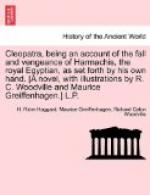And at length came the day which brought with it Quintus Dellius, that false Roman knight who ever served the rising star. He bore letters to Cleopatra from Marcus Antonius, the Triumvir, who, fresh from the victory of Philippi, was now in Asia wringing gold from the subject kings with which to satisfy the greed of his legionaries.
Well I mind me of the day. Cleopatra, clad in her robes of state, attended by the officers of her Court, among whom I stood, sat in the great hall on her throne of gold, and bade the heralds admit the Ambassador of Antony, the Triumvir. The great doors were thrown wide, and amidst the blare of trumpets and salutes of the Gallic guards the Roman came in, clad in glittering golden armour and a scarlet cloak of silk, and followed by his suite of officers. He was smooth-faced and fair to look upon, and with a supple form; but his mouth was cold, and false were his shifting eyes. And while the heralds called out his name, titles, and offices, he fixed his gaze on Cleopatra—who sat idly on her throne all radiant with beauty—as a man who is amazed. Then when the heralds had made an end, and he still stood thus, not stirring, Cleopatra spoke in the Latin tongue:
“Greeting to thee, noble Dellius, envoy of the most mighty Antony, whose shadow lies across the world as though Mars himself now towered up above us petty Princes—greeting and welcome to our poor city of Alexandria. Unfold, we pray thee, the purpose of thy coming.”
Still the crafty Dellius made no answer, but stood as a man amazed.
“What ails thee, noble Dellius, that thou dost not speak?” asked Cleopatra. “Hast thou, then, wandered so long in Asia that the doors of Roman speech are shut to thee? What tongue hast thou? Name it, and We will speak in it—for all tongues are known to Us.”
Then at last he spoke in a soft full voice: “Oh, pardon me, most lovely Egypt, if I have thus been stricken dumb before thee: but too great beauty, like Death himself, doth paralyse the tongue and steal our sense away. The eyes of him who looks upon the fires of the mid-day sun are blind to all beside, and thus this sudden vision of thy glory, royal Egypt, overwhelmed my mind, and left me helpless and unwitting of all things else.”
“Of a truth, noble Dellius,” answered Cleopatra, “they teach a pretty school of flattery yonder in Cilicia.”
“How goes the saying here in Alexandria?” replied the courtly Roman: “’The breath of flattery cannot waft a cloud,’[*] does it not? But to my task. Here, royal Egypt, are letters under the hand and seal of the noble Antony treating of certain matters of the State. Is it thy pleasure that I should read them openly?”
[*] In other words,
what is Divine is beyond the reach of
human praise.—Editor.
“Break the seals and read,” she answered.
Then bowing, he broke the seals and read:




